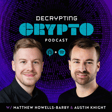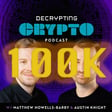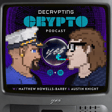Become a Creator today!Start creating today - Share your story with the world!
Start for free
00:00:00
00:00:01

Riccardo Spagni on Creating Liquidity with Security Tokens
We speak to Riccardo Spagni, one of the founding developers of Monero, about security tokens and how they can be used to create liquidity and channel for communication within organizations. We also discuss the latest privacy-enhancing technologies and what Riccardo thinks of Facebook's Libra project.
Transcript
Introduction and Guest Overview
00:00:12
Speaker
Hello, everyone, and welcome to another episode of the Decrypting Crypto Podcast. As always, I am joined by my co-host, Matthew House-Barbie. Matt, it's great to be here with you today.
00:00:23
Speaker
That's great to be chatting to you, Austin, again in another very uneventful week in the world of cryptocurrency, as always. So you had an awesome opportunity to speak with Ricardo Spagni, also known as Fluffy Pony on Twitter. Tell me a little bit about who Ricardo is and the conversation that you got to have with him.
00:00:47
Speaker
Yeah, I was kind of fanboying a bit here when I was chatting to Ricardo, I have to be honest. He's one of the founding members of the Monero core team. He's now kind of the lead maintainer of the Monero project. He's been working across like
00:01:06
Speaker
a number of different projects and he's a big advocate of privacy. He's been in the space from the really early days. He has a bizarre moniker that he goes under, which we dig into in the interview. But more than anything, I just thought he was actually just a really nice guy. And
00:01:25
Speaker
While there are a lot of great people that we've spoken to I think that there is also a lot of big egos in the blockchain space and one thing I would say about Ricardo from speaking to him I certainly didn't get that feeling from him and he's well within his rights really to have a big ego so really nice guy done a whole lot for the space and Yeah, it was a super interesting interview that we dug into
Libra's Humorous Moment and Relevance
00:01:50
Speaker
Yeah. And I know that you all went on to talk a little bit about the congressional hearings that are happening around Libra, which we've been discussing so much lately and the potential impact that that can have on the greater blockchain and cryptocurrency space.
00:02:04
Speaker
That's definitely something that I've been interested to hear about. I do want to mention that going off of last week's podcast, where we also discussed the congressional hearings, I gave a bit of an overview of some of the more poignant and interesting points that were made.
00:02:23
Speaker
in the hearings, but I actually neglected to mention the most important one. The one that was heard in halls all around the country and the world, which was that Representative Warren Davidson for the first time brought up a term
00:02:39
Speaker
that had not yet been heard in the halls of Congress, and that was shit coin. We went full crypto, didn't we? Yes. It has all come full circle. There is a fantastic tweet that we can link to with a video where you can watch that for everything that it is.
00:03:02
Speaker
That's all I want from a congressional hearing, really. It just gets straight to the important points and gives me the comic relief that I desperately need. Brilliant stuff. That's really good stuff. Yeah, so with Ricardo, yeah, it was definitely interesting.
00:03:22
Speaker
We said at the start of this series, right, every time we get on a guest, we're gonna, we're gonna ask that guest what they think about Libra. Is it a, is it a force for good? Is it a force for evil? With someone like Ricardo, I think that was a very interesting question to pose because it's someone that
00:03:40
Speaker
has ultimately been incredibly pro-decentralization and to the extreme right like Monero is one of the like OG privacy coin projects they value privacy more than anything and I think it's it's somewhat interesting and very very entertaining to hear Ricardo's response to some of this I think that we're getting a lot of
00:04:06
Speaker
Different opinions here. I thought that his answer to the question was was very balanced But he shared some really interesting insight that I'm not going to kind of spoil because he gives some really good stuff right at the end of the interview around that but outside of the
00:04:22
Speaker
the Libra piece, which seems to be all encompassing right now in the blockchain space.
The Rise of Security Tokens
00:04:29
Speaker
I went through a few things with him and Riccardo has been talking a lot about security tokens. Security tokens we have kind of touched on quite a bit in series two, we had a great interview with Andrew Keys from Consensus, which for any of you that haven't listened to that one, go back into the archives and listen to it because it's
00:04:50
Speaker
It's one of those episodes I remember when I was doing the interview and it's like my mind was kind of exploding as Andrew was talking but we talk a little bit about what it would look like to tokenize a company and also Ricardo kind of shares with us what some of the things in the privacy-based technologies he's most excited about.
00:05:13
Speaker
And, and also more importantly, I pose probably the biggest question of all to Ricardo at the start here. And I ask him why he goes under the pseudonym Fluffy Pony and we reveal all, you know, we only answer and ask the most important questions here on the podcast, right? All right. So we've given a bit of an overview there. Let's dive straight into the interview with Ricardo Spaniard.
00:05:50
Speaker
Ricardo, it's great to have you on the podcast. Thanks for joining us. Thank you so much for having me.
00:05:56
Speaker
So for all of our listeners out there, Ricardo Spani is the lead maintainer of Monero. He was one of the founding developers there and goes under the pseudonym Fluffy Pony. And that's where I thought I would begin our interview on probably the most important question of all. For any of our listeners that don't know, could you explain why you go under the pseudonym Fluffy Pony, Ricardo?
00:06:23
Speaker
Start with the easy question why don't you know I got given the nickname the moniker many many years ago one of my first jobs and I have tried to shake it you know and it just stuck so
00:06:43
Speaker
When I first got involved with Bitcoin, I went through a bunch of pseudonyms because I was deathly afraid that the government was going to come kick down my door for working on this terrible device of software. And when things settled down, I was like, OK, I'm not going to get arrested for doing this. And I started using my fluffy pony nickname, which I've had for like
00:07:10
Speaker
at this point in time, it's nearly two decades. And I started using it for cryptocurrency related stuff. And I was like, well, you know, if no one's going to complain, that's great. I feel like of all the industries right now, it's probably one of the more accepting of random pseudonyms as well. Definitely.
00:07:29
Speaker
Okay, well, let's let's jump into some of the slightly more important questions at hand. And one of the things I've been following a lot of the things that you've been doing over the years, Ricardo, I find your Twitter very entertaining. So any of our listeners that haven't been following Ricardo on Twitter, you should definitely do that. But recently, I've seen you writing a lot about and talking quite a lot about
00:07:53
Speaker
along with the rest of the industry, to be honest, security tokens. And for a lot of our listeners, either getting their feet wet slightly with cryptocurrencies and blockchain technology, and there's a lot of terminology to get a handle of. And I wondered if you could give a basic explanation to our listeners on what a security token is.
00:08:13
Speaker
Sure, so I think the basic idea of a security token stems from this idea that right now if you have a company and you want to have shares in it or you want to offer shares in it, then you do so through the traditional mechanism of commercial agreements and share certificates and so on.
00:08:35
Speaker
And that's fine. There's absolutely nothing wrong with that. But the problem is when the person who owns the shares wants to get rid of them for whatever reason, maybe they need the money, they have their reasons for wanting to sell. And unless it is publicly traded, it is extremely difficult
00:08:56
Speaker
to sell those shares because you basically have to go out and hunt for effectively just like a random third party to buy your shares. So the idea goes, what if instead of issuing those shares through the traditional means, we issued them through a token and the token can be on, it doesn't matter how the token itself is issued, that can be on Ethereum or Atari or whatever, it doesn't matter, cut it coins.
00:09:25
Speaker
But the idea is that now, instead of me having shares, I've just got these tokens that represent shares. And now there can be a secondary market because a cryptocurrency exchange
Security Tokens: Revolutionizing Investments
00:09:36
Speaker
can go and add support for shares effectively in Ricardo's ice cream company.
00:09:44
Speaker
And those can trade freely. There can be a price discovery mechanism because of that. And there can be all sorts of interesting things that can happen because these shares now exist and are traded freely. And of course, exchanges are regulated. So there's nothing wrong with it. It's not like we're talking about unregulated or illegal securities. Of course, you can do those as well. And you can trade them on decentralized exchanges. But in the context of security tokens, it largely seems to be
00:10:12
Speaker
The discussion seems to be around how to do so in a regulated fashion and and there's there's a lot of discussion about whether security tokens should just represent shares like one to one should they carry voting rights you know there's there's all sorts of things like that and or should they just be
00:10:33
Speaker
Effectively like all i care about is i wanna profit from the existence of this company so you know i care about the my token going up in value and selling it later on which is typically what security does i don't care about dividends i don't care about voting rights so there's there's a lot of discussion about.
00:10:51
Speaker
what it should look like and what what the ideal security token should look like and i think that ultimately it's gonna depend on a case by case basis some companies will be a towards. You know companies that do decide to issue this way will be a towards more traditional one token represents one.
00:11:08
Speaker
share and you have voting rights and you get dividends and an ad and there'll be others which are it almost doesn't matter at all it's just to have this like ability to exit earlier and the reason it's exciting is because if you take a look at
00:11:26
Speaker
venture capital firms as an example and they're obviously they spend a lot of time and money and effort investing in early stage startups. VC firms typically the amount of time it takes to go from an early stage investment to a liquidity event i.e. when they sell their shares and get a bunch of money for all the risk they took is nine years.
00:11:48
Speaker
which is an incredibly long time. And it's also incredibly high risk. They need to make investments where they are as certain as they can be that this company is still going to be around in nine years. And the reward they get is commensurate with the risk.
00:12:06
Speaker
But it's still just like just possibly one of the most risky things that you can do. Now flip it on its head and go like, hey, we can exit pretty much whenever we want because there's this, you know, free floating market that exists and we can exit over time. So we can go like we're two years in, the company's doing well, but we'd like to
00:12:28
Speaker
exit just a little bit of our position in order to claw back some liquidity to invest in other startups. So now it opens it up and it means that not only can VCs reinvest funds a lot faster, which is of course great for entrepreneurs, but it means that ordinary people can go pick these shares up on the secondary market
00:12:51
Speaker
where they might not have been able to, they wouldn't have been exposed to the deal flow on that sort of primary issuance. So they can go to the secondary markets, which would be a normal exchange, buy tokens in this really cool idea, which is actually coming to fruition.
00:13:06
Speaker
and then hold on to them for however short or long period of time they feel is necessary and then go and sell those tokens back in the market if they feel that the company is going nowhere or if they feel the company is successful and they've made enough money.
00:13:22
Speaker
I think that's a really interesting part of security tokens. It seems like to distill down some of the things that you've talked about there, from a benefit point of view, you've got where you would traditionally have non-liquid assets in non-public companies, i.e. buying shares in a privately held firm.
00:13:42
Speaker
you now immediately create liquidity. You can buy, sell, and you can do that in a much more trusted way than going through just like a deal with an individual that you have no real trust around. And I mean, we've seen a lot of that with companies like one that comes to mind as a Coinbase. I mean, this happens outside of blockchain, right? Where I know a lot of the early investors in Coinbase's like seed rounds were being contacted.
00:14:10
Speaker
can I buy your shares on the secondary market? Coinbase can then turn around and say, hey, part of the agreement is you can't sell these until a liquidity event. So that's a challenge for investors. I think it also puts a lot of pressure on startups when you have one giant or two giant VC firms that are waiting for an exit in nine years. That's going to sway the decision making process, put a lot of pressure on the startup owners as well. I think from a
00:14:36
Speaker
consumer point of view as well, right, democratizes the investment opportunity, which is only good because I do think while VCs take a lot of the risks, they also hold way too much power in the space. Yeah, they do. I mean, that's definitely true. And I think there's a challenge there because I don't
00:14:56
Speaker
I don't want to speak ill of VCs. They put a lot of effort into what they do. They certainly don't earn the money that they earn through doing nothing. And they take incredibly high risks. At the same time, I think that there are a lot of people that would be willing to take the high risks as well. And I think particularly of
00:15:15
Speaker
You know, if I think back to like my grandparents and even to some degree my parents, their generation, it seems to me that the path to success was buy a house, a small starter house as soon as possible, as soon as you can, with a bond. And then you sort of like go from that new upgrade, new upgrade, and then eventually, like, you know, by the time you retire, you're living the lifestyle that you wanted to live.
00:15:44
Speaker
You've got a whole class of people now, like millennials and even more recent generations, who are crushed under student debt and just the fact that everything has changed around them. And they can't afford to go do the let me buy a starter house and let me have one job my entire life. And so they're constantly striving. And that's why cryptocurrencies have been so appealing to those generations because it's a way of
00:16:12
Speaker
gaining the success that their parents were able to slowly claw their way to, but being able to do so despite the crushing mountain of debt and so on that they all seem to be faced with, that we all seem to be faced with. And that's also where it becomes really interesting because now you're saying to
00:16:30
Speaker
those groups of people like, hey, you want to invest in startups, you want to do the high risk stuff because you're young and because you can afford to. Yeah, as a way that you can, even though you're not a, you know, a trust fund baby who's able to throw money at a VC as a limited partner.
00:16:48
Speaker
Yeah, and I think you can take smaller steps in as well with that kind of approach. One thing that you touched on briefly there, Ricardo, reminds me of, we were interviewing last year, I think this was, Andrew Keys from ConsenSys, and we dug into
00:17:08
Speaker
I guess I would broadly call it the tokenization of everything.
Tokenizing Companies: A New Frontier
00:17:12
Speaker
I find this a particularly fascinating topic. I saw you wrote about the idea of tokenizing a company, which seems to fall in line with security tokens and this whole idea. I wonder if you could elaborate a little bit more on the idea of tokenizing a company, because I've seen some of your interesting thoughts around how this might work and what the benefits of doing something like this are.
00:17:35
Speaker
Sure. I mean, some of the things that really appeal to me about this idea of tokenizing a company is, I mean, I've done the startup thing a lot and there's the constant drumbeat of the same issues and I am
00:17:54
Speaker
I'm really bad sometimes at just keeping investors, those early investors, in giving them an overview of what's happening. It's so difficult to put out a quarterly newsletter. To someone who hasn't had a startup, it doesn't seem like it would be a difficult thing.
00:18:16
Speaker
You know this stuff is moving so quickly and you start drafting this newsletter and then by the time it goes out, it's out of date. And you're trying to encapsulate all the things and you're trying to like, you're careful about how you present the challenges that you're facing because you don't want to sound like an idiot. And you're doing all this stuff and...
00:18:35
Speaker
And you're not really getting input back from investors. A lot of them will like that you'll end up with a newsletter that's too dense and they won't read it. And you won't really have a way to engage with them. So one of the things that's really interesting to me about tokenizing a company is it doesn't matter how small or big shareholders are. If you issue a million shares but as tokens,
00:18:56
Speaker
or 10 million shares as tokens, then you can embody those shares with voting rights and you could actually do the voting in a cryptographically secure way. So they would be able to vote, and we're not even talking about voting on the blockchain.
00:19:12
Speaker
You can build a totally centralized system for this, but that centralized system can validate that the vote that is cast is by the person who holds these tokens. They've got the private key for these tokens. And that becomes really interesting because you can build a totally secure voting mechanism that's like the equivalent of a Twitter poll.
00:19:36
Speaker
You know, we're thinking of approaching this large customer. Should we do that? Yes or no. You know, you can you could do it in a robust and secure way. And I think that that is hugely interesting because it means that it just opens the floodgates to like all sorts of cool interactions with your investors.
00:19:59
Speaker
You know, being able to ask investors for recommendations. I mean, that's an obvious or introductions or whatever. That's an obvious one. But it's one that's often done pretty badly. And you've got other issues as well with that where you don't always know who your investor pool is. You know, you're like, OK, cool. We've got these 10 investors that we sold to.
00:20:21
Speaker
But you don't know that they've set up like one of them set up a pass through and they've opened it up to like a bunch of other people. And so when you end up sending out a request for feedback or request for an intro or recommendation, you're only hitting the top of the pool there. You're not actually hitting the people that are in the shares. So so by making this a almost a more personal experience for investors, I think there is so much power and so much potential.
00:20:49
Speaker
So it almost sounds like you see this as like a communication channel in itself. Absolutely. Because you can validate that the communication that's coming back is definitely from the person who owns the shares. And that alone is an invaluable thing.
00:21:05
Speaker
Yeah, no, that sounds like a fantastic idea. I think that is clearly a huge challenge, especially when you're trying to speak to the individual themselves that has a stake in what's going on in the company. Yeah, exactly.
00:21:22
Speaker
So one of the other areas to jump on from this, because I think I could honestly talk about tokenization all day. I find this one of the most interesting pieces around blockchain and cryptocurrency as a whole. But we couldn't have one of the kind of core Monero team founders on the podcast and not discuss privacy. And I've seen you write a lot about some of the
00:21:46
Speaker
more emerging technologies or privacy enhancing technologies that are coming through right now what what excites you most about what's being discussed in relation to privacy enhancing technologies at the moment.
Privacy Enhancements in Crypto
00:22:00
Speaker
I think one of the things that really excites me is Monero has got a very specific focus. Monero's focus is to provide maximal privacy by default and to do so in a way that works just fine on mobile and on web and on everything.
00:22:17
Speaker
And it succeeded in that goal and there's this constant drumbeat of improvement. The Monero Research Lab, which is this open collective of scientists and academics trying to improve Monero, they're constantly finding new innovative things that Monero can add in the future.
00:22:37
Speaker
So that really excites me with regards to Monero. But in the broader ecosystem, I'm seriously excited about the amount of effort that's being put into adding privacy to Bitcoin. And I think that there's a lot of stuff is largely experimental right now. And there's
00:22:53
Speaker
You know, there's going to be some failed experiments and some successful experiments. And honestly, adding privacy to Bitcoin is legitimately hard because ultimately everything's traceable. So, you know, you're basically fighting against the very nature of Bitcoin's blockchain. But there's a lot of cool stuff that's being done with things like Lightning because you can take stuff off chain.
00:23:15
Speaker
And you can provide added privacy off chain. And then even when channels close and stuff settles back on chain, it's not a big deal because all you see are the final balances updating. You don't actually see who transferred to who in the interim. And the longer those channels can stay open, the better it is for privacy.
00:23:35
Speaker
So there's, you know, there's a lot of stuff like that. And now you can start leveraging things like, you know, I need to enhance my privacy or the privacy of my Bitcoin transaction. So instead of me paying the person directly, I'm going to send the Bitcoin to someone over the Lightning network and they're going to make the on-chain payment for me.
00:23:56
Speaker
So there's stuff like that where, you know, and there's ways to do that in a trustless fashion, stuff that's still being researched and designed. But there's lots of really cool things that can be done because being off-chain is basically the equivalent of like going from Bitcoin into Monero, you know, because you're moving off Bitcoins.
00:24:18
Speaker
all the stuff that's exposed on Bitcoin's chain and you're moving into like an entirely different world. So over and above that, I'm also really, really interested in the work that's being done by like Wasabi, Wallets and Samurai. I think they're both doing excellent work.
00:24:34
Speaker
They've had a bit of a tiff lately with each other and I think that's good. I think that competition between privacy enhancing technologies is good. I think they should be trying to rip each other's faces off because they sharpen each other that way.
00:24:49
Speaker
And they make it an incredibly competitive environment, which is ultimately for the benefits of the consumer, of the end user. So despite their differences and their little stuff, I think it's ultimately a good thing. Well, usually the crypto space is so mellow and free of drama. I know, it's so relaxed. So it's so unusual that anyone would feel strongly about the thing they're working on.
00:25:18
Speaker
How do you respond? Because I've listened to interviews you've been on in the past and not just with yourself, but people from teams like Zcash and a bunch of the other big privacy related projects. And there seems to be some of these common arguments against privacy related technologies. And I think less kind of some of the more off-chain solutions that you talk about with Bitcoin and more kind of like
00:25:46
Speaker
anonymous addresses, things like that, or stealth addresses, should I say. So one of the things I hear a lot is people that are good actors shouldn't require privacy solutions. And how do you tend to approach that
00:26:04
Speaker
I know it's quite broad, but I just hear this so often, and I often want to understand as someone who's so deeply entrenched in thinking about privacy from this angle, how you think about responding to some of those.
00:26:17
Speaker
Yeah, that's a good question. It infuriates me, the fact that it even comes up at all in the public sphere. Because privacy is really the natural state of things, right? I mean, if you go to the bathroom, to a public restroom, you go into that bathroom and you close the door.
00:26:35
Speaker
You don't leave the door open because you might be planning to overthrow the government inside the cubicle. And so everyone needs to be able to monitor your toilet activities. I mean, it's ludicrous. It's certainly ludicrous to even think that way. We closed the door. We want privacy. We're doing our private thing inside the bathroom. Thank you very much. I'd like the door closed. And yet we go like, oh, well, that's fine. But we can't have digital privacy.
00:27:05
Speaker
Everyone needs to be able to read our emails, because what if we're planning to overthrow the government via email? Which also seems ludicrous, because if you were planning to overthrow the government, surely you'd meet with other people in person rather than sending an email. So what I'm hearing here, Ricardo, is I need to go to the bathroom with the door open from now on. I think it's just to be safe.
00:27:26
Speaker
And in fact, a line of reasoning is something I've used with people on Twitter, not so much the bathroom thing, but I've said to them, when they say to me, oh yes, but you don't need privacy if you've got nothing to hide, I'm like, okay, great. In order for us to be sure, as the general public,
00:27:44
Speaker
In order for us to be sure that you are not a terrorist, would you mind putting three months bank statements up on Twitter so that we can inspect it and make sure you haven't been receiving payments from, like, Al-Qaeda? And no one's taken me up on that offer. And I'm not sure why. I guess it's because, you know, maybe then they realize that everyone needs privacy, not just... Or they are, in fact, from Al-Qaeda. Or, you know, it could be that. In fact, that's also entirely possible. I haven't thought of that.
00:28:12
Speaker
But it is crazy that when you pointed out to them that they don't even, I mean sometimes they do do an immediate turnabout. I have had people who have gone like, you see the penny drop and you can almost like, over the magic of Twitter, hear the gears going in their head and you can sort of hear them like processing that and going like, wow, okay, I never thought of that.
00:28:39
Speaker
I actually don't want my bank statements all over Twitter. I guess some privacy is good. Right. And I think that it seems to me that perfectly falls in line with a lot of the
00:28:50
Speaker
debates around privacy. And I would argue a lot of the things that come up in blockchain and the broader space where everything seems to be an argument on the extreme and the nuances of things is often lost. As we're kind of coming close to time, I wanted to just get one slight tangent that's highly related to privacy.
Critique of Libra's Privacy Concerns
00:29:13
Speaker
And I wanted to just get your general thoughts. We've been asking a lot of our guests
00:29:18
Speaker
this question as they've been coming on over the past few weeks. And I I'm already anticipating the the sigh that is going to come from you, because I'm going to ask what your thoughts are on Libra, the cryptocurrency launch by Facebook. And broadly speaking, do you see this project as something that is a force for good in the crypto movement or evil?
00:29:44
Speaker
Yeah, it's actually a really good question. So I don't know if I believe that people are going to flock to using Libra, realize that Libra is evil or bad or whatever, and then
00:30:01
Speaker
switch to using Bitcoin or go and discover Bitcoin or whatever. I suspect that people will use Libra and go, well, it'll be like PayPal, right? It'll be like, well, it mostly works for me or I can somehow fudge it to work for me if I just do these 13 steps. And so that's fine. I don't mind the friction because everything else is relatively easy. So I'm just going to run with it.
00:30:28
Speaker
And that will be really sad if that's the case because Libra is bad for privacy. They have absolutely no interest in adding privacy of any sort. In fact, by their own admission, by David Marcus' own admission, privacy is bad. And so I am deeply concerned that Libra will end up doing more harm than good because it will basically just make Facebook
00:30:55
Speaker
the law enforcement agency and the enforces of the keepers of what is potentially bad and what is potentially not bad, you know, they'll be the investigating officer on the case. And that's not really, I don't see why Facebook should be given that power at all.
00:31:17
Speaker
Yeah, I think it's a good point. I think that some of the more concerning aspects for me lie kind of outside, well, I mean, of course with Libra itself, but almost more outside for me, the fact that Facebook is
00:31:33
Speaker
launching Calibra, the wallet solution, which is basically their way of now ultimately owning the Libra ecosystem and the payment ecosystem. I think one of the counter arguments that I think is very valid in this whole debate is around Facebook's relatively unique position right now
00:31:57
Speaker
to give people a taste for crypto in mass. And I do think that there is something in the fact that while, to an extent, I definitely agree, I don't think people are going to use Libra and then be like, oh, no, this isn't private enough for me. Otherwise, people would be switching off Facebook and then they move on to Bitcoin. I wonder if with their move into the space, this will at least shine a light and
00:32:23
Speaker
calm some of the kind of more hyperbolic concerns around it still, Bitcoin just being for criminals, etc, etc.
00:32:32
Speaker
Yeah, I mean, I guess the biggest issue is there's a lot of conversation around Libra, which is not incorrect, where people are basically alluding to the fact that Libra is not a cryptocurrency. It's not like Bitcoin. And I think if that becomes the common dialogue, then
00:32:54
Speaker
then I don't know if it'll really change things much, at least not ready for regulators. Because if you look at the conversation that regulators have had around Libra, they're not stupid. They immediately went off to Facebook.
00:33:14
Speaker
And they might not directly have great knowledge about cryptocurrencies, but they have people on their staff that are educated on the topic. And those people have been able to say to them, like, this is not the same as Bitcoin. You can't stop Libra. You can't stop Bitcoin. Yeah. And I think that the fact that making sure that people always remember
00:33:41
Speaker
This is ultimately a commercial venture from Facebook, Uber, MasterCard, Visa, all on the Libra Association. And it is not even necessarily, in my opinion, in their interest to push the fact that this is a cryptocurrency. If anything, I think that labeling it that way, which I think from a technology point of view, there are clearly holes in that. But them almost having a softer approach will probably make it a lot easier with regulators that way, right?
00:34:11
Speaker
Yeah, and that's why I'm very interested in seeing how things play out. I do hope that this ultimately forces regulators to get clued up, to get more clued up than they have been. And that's really possibly one of the better outcomes from this is regulators going and being like, I need to understand exactly how Libra is not the same as Facebook.
00:34:36
Speaker
Yeah, I think that's certainly a potential silver lining. I mean, I'm sure we're going to see how all of this unfolds.
Closing Remarks and Follow-up
00:34:43
Speaker
But Ricardo, it's been great to get some of your opinions, your knowledge. And I really appreciate you taking the time out to speak to us on the podcast. What's the best place for some of our listeners to go and find out more about what you're working on and generally stay in touch with what you're doing? The best place to follow me is on Twitter. I'm at Fluffy Pony on Twitter.
00:35:04
Speaker
Spelt the way it sounds. And for Monero, getmonero.org is the website. I'm also currently working on Tari, which is a decentralized assets protocol that's being architected on top of Monero for things like security tokens. And if you want to learn more about Tari, then tari.com, T-A-R-I. And yeah, it's been great having me. Thanks so much.
00:35:28
Speaker
It's been absolutely my pleasure. We'll make sure we share out all those links in the show notes. Thanks again, Ricardo. Cool. Thanks so much.
00:35:38
Speaker
Thanks for listening. If you love this episode and want to show your appreciation to myself and Matt, give us a review on iTunes or your favorite podcasting platform. We really appreciate that. You can also visit thecoinoffering.com to learn more about cryptocurrencies, get caught up on some news, see how your currency is performing. And you can follow us on Twitter at thecoinoffering as well as email us at podcast at thecoinoffering.com if you'd like to get in touch.
00:36:12
Speaker
The contents of the Decrypting Crypto podcast should not be used and are not intended as investment advice. Please do your own due diligence before making any investment, cryptocurrency or otherwise.




![CBDCs: The [Dark] Future of Money (Part 2 of 2) image](https://media.zencastr.com/cdn-cgi/image/width=112,quality=85/image-files/61fc0461fb20e00040aeb09e/5b9f1396-2a8e-418d-82a0-30fd00969266.jpg)






